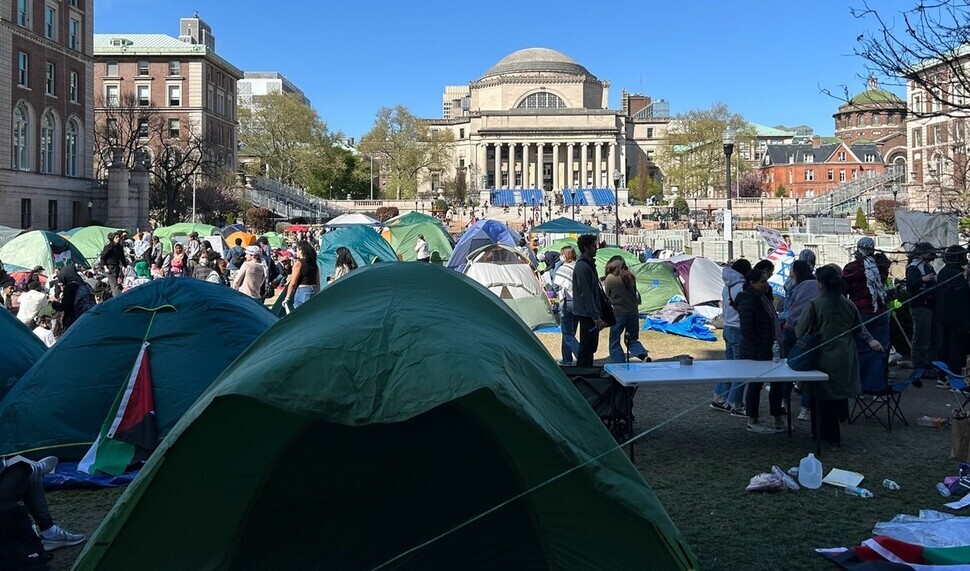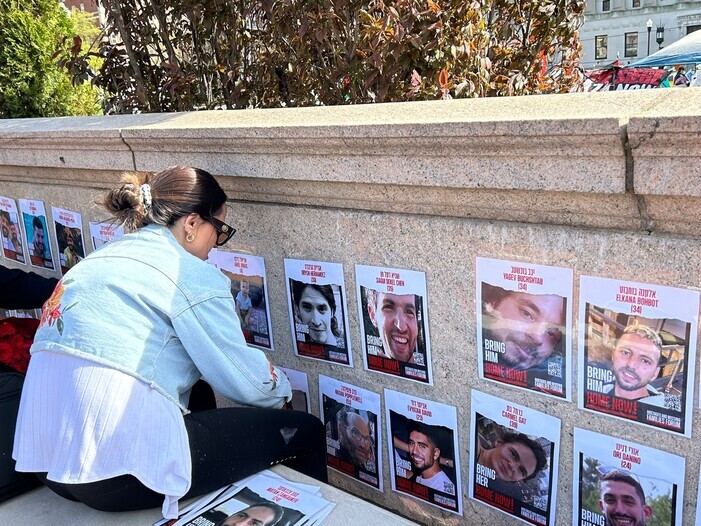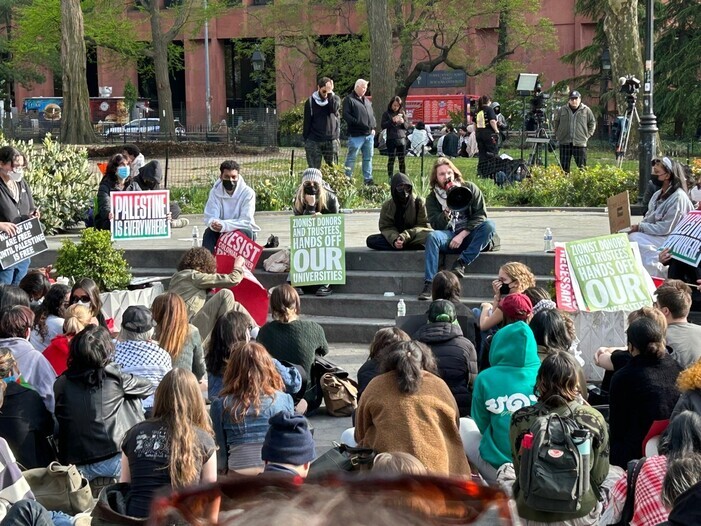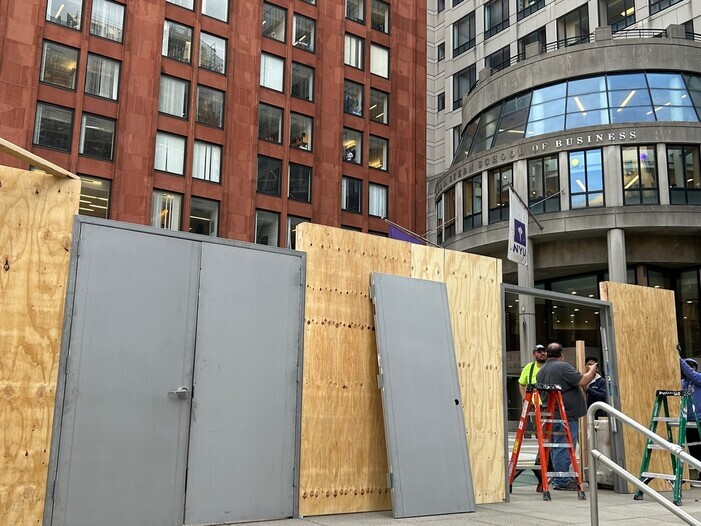hankyoreh
Links to other country sites 다른 나라 사이트 링크
[Reportage] On US campuses, student risk arrest as they call for divestment from Israel

“Antisemitic? I’m Jewish, and my friend here is Jewish, too,” the protester objected, his eyes wide.
I’d just noted that some critics say the encampment on the lawn of Columbia University, in Manhattan, New York, is antisemitic.
“There are about 200 Jewish people who come and go from the encampment,” said the protester, who only identified himself as Ari.
When I asked if the protesters worried about getting arrested or suspended, Ari countered: “Us getting suspended wouldn’t be anything compared to the genocide that the people of Gaza are experiencing.”
After around a hundred students were arrested the day after they set up an encampment on April 17, a somber and tense mood hung over the campus of Columbia University, a flashpoint of US college students’ resistance to complicity in the war on Gaza.
Police were positioned at the main gate to the university, which is now chained shut. Students and staff had to enter through a side door that was blocked to outsiders.
Protesters want universities to divest from companies that “profit from genocide”
Columbia University had announced the day before that it would be moving classes online for students’ safety.
Reporters were only allowed on campus between 2 and 4 pm. Staff checked my ID card and jotted down my name and the name of the newspaper before letting me inside.
I spoke with an economics lecturer who was headed to campus even though in-person classes had been called off. “I came because I was curious about what’s going on. I support the students’ action,” he said.
In the fenced-off encampment, which consists of around 30 tents, protesters could be seen discussing issues and sharing food. There were a few people — participating school staff, perhaps — who were painting slogans on posters alongside their young children.
I asked one student basking in the sunlight if the protesters got cold sleeping in the tents at night. “It’s freezing,” the student said.
The protesters make sure that articulate students are on hand during the university’s press hours to make their case to the public. The students said they won’t leave the encampment until Columbia University agrees to their demands, which include divesting from companies that profit from Israel’s genocide and occupation of Palestinian land.

I also spotted a few counterprotesters nearby, including a student who was putting up photographs of Israelis who had been kidnapped by Hamas, the Palestinian militant group, along a wall nearby.
“There are a lot of people who can’t see the big picture,” the student said, glancing over at the encampment. The student said that Hamas ought to release the hostages and get to work rebuilding the Gaza Strip.
US should halt financial and weapons aid to Israel, protesters say
Guards were also stationed at every building at New York University (NYU), also in Manhattan, to check ID cards and strictly control access to campus. The previous evening, the police had arrested 133 protesters at Gould Plaza at the school’s request. When I visited on Tuesday, the plaza was being boarded up, apparently to keep students out.
With NYU shutting down on-campus protests, students and citizens held a demonstration in the park across from the school. “They had the students taken away because they’re afraid of our voices getting out there,” said a person who was handing out fliers.

“The Biden administration needs to stop giving money and weapons to Israel. It’s disgusting,” said Jess Eiken, a student at NYU.
More student encampments go up at Yale, Michigan and MIT
The student movement is currently spreading around the country.
Sixty students were arrested by the police at Yale University the day before. Other encampments were set up the same day at the University of Michigan, Emerson College, Tufts University and the Massachusetts Institute of Technology (MIT).
Students at the University of New Mexico held a second day of protests on Tuesday. At the University of Minnesota, nine people were arrested at an encampment.
Meanwhile, universities are vacillating about how to respond to students’ actions. There have been calls from politicians and pro-Israeli donors to quash what they call “antisemitic” forces.
But many say that suppressing calls to stop the slaughter, which is not the same as antisemitism, amounts to rejecting the freedom of expression — at universities, of all places.

Barnard College, which is affiliated with Columbia University and located near it, has suspended students who were arrested for joining the encampment and banned them from even entering school buildings.
Donna Lieberman, the executive director of the New York Civil Liberties Union, told the Associated Press that it was unjust to suppress opposing political opinions and conflate criticism of Israel with antisemitism.
But Minouche Shafik, the president of Columbia University, said Tuesday evening that the school would consider other options if the protesters at the encampment did not disperse by midnight, suggesting she might bring the police back in.
Shafik had asked the police to clear out the protesters just one day after coming under fire at a congressional hearing on April 17 to crack down on antisemitism on college campuses. Now others think she should resign for being under the thumb of Republican lawmakers.
The Columbia University senate seems poised to censure Shafik for calling in the police to suppress the student protesters. Considering how students at other universities were outraged by the mass arrest of students at Columbia, it is unclear what the consequences of a second round of arrests might be.
By Lee Bon-young, Washington correspondent
Please direct questions or comments to [english@hani.co.kr]

Editorial・opinion
![[Editorial] Penalties for airing allegations against Korea’s first lady endanger free press [Editorial] Penalties for airing allegations against Korea’s first lady endanger free press](https://flexible.img.hani.co.kr/flexible/normal/500/300/imgdb/original/2024/0502/1817146398095106.jpg) [Editorial] Penalties for airing allegations against Korea’s first lady endanger free press
[Editorial] Penalties for airing allegations against Korea’s first lady endanger free press![[Editorial] Yoon must halt procurement of SM-3 interceptor missiles [Editorial] Yoon must halt procurement of SM-3 interceptor missiles](https://flexible.img.hani.co.kr/flexible/normal/500/300/imgdb/child/2024/0501/17145495551605_1717145495195344.jpg) [Editorial] Yoon must halt procurement of SM-3 interceptor missiles
[Editorial] Yoon must halt procurement of SM-3 interceptor missiles- [Guest essay] Maybe Korea’s rapid population decline is an opportunity, not a crisis
- [Column] Can Yoon steer diplomacy with Russia, China back on track?
- [Column] Season 2 of special prosecutor probe may be coming to Korea soon
- [Column] Park Geun-hye déjà vu in Yoon Suk-yeol
- [Editorial] New weight of N. Korea’s nuclear threats makes dialogue all the more urgent
- [Guest essay] The real reason Korea’s new right wants to dub Rhee a founding father
- [Column] ‘Choson’: Is it time we start referring to N. Korea in its own terms?
- [Editorial] Japan’s rewriting of history with Korea has gone too far
Most viewed articles
- 160% of young Koreans see no need to have kids after marriage
- 2[Editorial] Japan’s rewriting of history with Korea has gone too far
- 3Vietnamese war victims speak of sexual violence by S. Korean troops for the first time
- 4For survivor, Jeju April 3 massacre is a living reality, not dead history
- 5[Column] Park Geun-hye déjà vu in Yoon Suk-yeol
- 6[Reporter’s notebook] In Min’s world, she’s the artist — and NewJeans is her art
- 7[Editorial] Penalties for airing allegations against Korea’s first lady endanger free press
- 8Presidential office warns of veto in response to opposition passing special counsel probe act
- 9Hybe-Ador dispute shines light on pervasive issues behind K-pop’s tidy facade
- 10[Special Feature Series: April 3 Jeju Uprising, Part III] US culpability for the bloodshed on Jeju I